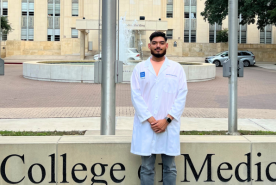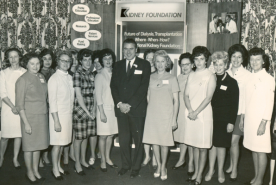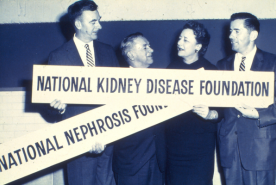Working is very important to many people who have kidney failure, also known as end stage renal disease (ESRD). It can help them to have a feeling of value to their families, to society and to themselves. As an employer, you probably have many questions about how hiring or continuing to employ someone with kidney failure could affect you and your business.
What is end stage renal disease?
End stage renal disease is now a fairly common problem in the U.S. population, with about 200,000 patients undergoing treatment. It means that the kidneys have lost about 85 to 90 percent of their ability to function. The kidneys' job is to filter toxic wastes from the blood. These wastes can build up in the body and cause death if not removed by treatment.
How is end stage renal disease treated?
Two types of treatment are available for end stage renal disease – dialysis and transplantation. Dialysis is a method of cleaning the blood by removing the fluid and toxic wastes that the kidneys normally get rid of. Two types of dialysis can be done. The most common is hemodialysis, which involves cleaning the blood by pumping it through a machine that has a special filter called a dialyzer. Hemodialysis can be done at a dialysis center or at home.
The second type of dialysis is called peritoneal dialysis. In this method, a plastic tube called a catheter is implanted in the abdominal wall by a small operation. To do the treatment, the patient places a cleansing solution into his or her abdominal cavity through this catheter. The lining of the cavity acts as a natural filter, and wastes accumulate in the cleansing fluid, which is drained after four to six hours and discarded. While the cleansing fluid is in the patient's abdominal cavities, he or she can go about normal daily activities. Some patients are able to do another form of peritoneal dialysis that can be done during the night while sleeping.
Another form of treatment is a kidney transplant. Kidney transplants can come from living donors who are usually close relatives of the patient or from people who died recently (non-living donors). The success rates of both types of transplants are good.
How do ESRD and treatment affect a person's ability to work?
With medical advances, the treatments and medicines available today help many ESRD patients to feel stronger and have more energy. There may be some fatigue at the beginning while patients are getting used to dialysis treatments. However, this should decrease in time. Studies have shown that most ESRD patients have good attendance records. So employers should rest assured that having an employee who has ESRD does not necessarily mean that the individual will be missing a lot of days. Many people with ESRD are conscientious and valued employees who make a contribution to their place of business.
Dialysis
Patients who choose dialysis may need a temporary reduction of hours to help them ease into their new routine. Those who choose in-center hemodialysis need to go for treatments about three times a week for three to four hours. Many dialysis centers have flexible schedules to accommodate working people, and the employee with ESRD may be able to arrange dialysis treatments in the evenings. If this is not possible, the employee may need to arrange "flex-time" a few days a week, perhaps coming in earlier to make up for leaving early for treatments. Patients who choose home hemodialysis can do their treatments at their convenience so they will not interfere with their work schedule. Patients who do continuous ambulatory peritoneal dialysis (CAPD) will be able to work regular hours, but will need to have a clean, private area in the workplace to do their exchanges (removing the old cleansing fluid and adding fresh fluid). This process takes about a half hour and must be done three to five times every 24 hours. Those who choose automated peritoneal dialysis (APD) can plan to do their treatments at times that will not interfere with their work schedule.
Transplant
Employees who are candidates for a kidney transplant will need time off for the surgery (one to three weeks) plus some additional time at home before they are ready to return to work. If they expect to get their kidney transplant from a living donor, surgery can be scheduled to meet their needs. If they are on a waiting list for a non-living donor kidney, however, they may need to take time off on short notice, when a kidney becomes available for them. After regaining their strength and returning to work, most transplant patients should be able to resume their regular work schedule.
Will the employee need to be switched to another job?
In some cases, yes. Medical circumstances may limit an employee's ability to do a particular task. For example, if the job involves heavy physical labor, it might be necessary to restructure the job so the employee is using other skills. This will vary according to the individual and the type of job.
How can businesses accommodate people with ESRD?
Employers can do many things to assist individuals to re-enter or stay in the workplace. Following are some of the ways employers can help:
- making the workplace readily accessible
- restructuring the job if needed
- creating part-time positions
- reassigning individuals to vacant positions with different job requirements
- creating positions that allow job sharing.
The job description should be clear so both employer and employee understand what is to be performed.
Who pays for ESRD treatment?
Treatment for ESRD is expensive, but the federal government, through Medicare, helps to pay for much of the cost. Often, private insurance or state programs pay for the balance not covered by Medicare. Most dialysis and kidney transplant patients are eligible for Medicare regardless of their age. Home or self-care dialysis patients are eligible for Medicare the first month of dialysis. Patients who receive dialysis at a facility are not eligible for Medicare until the fourth month of treatment; during the waiting period, they must rely on the coverage they had before starting dialysis. Someone who has a transplant before going on dialysis generally is eligible for Medicare coverage starting the month the transplant is done.
If your group insurance plan covers kidney disease and its treatments, the plan may be responsible for some of the employee's bills. The employer group insurance plan would be the primary payer for the first 30 months after the patient becomes eligible for Medicare.
Are any benefits available to employers of someone with ESRD?
In addition to the satisfaction that comes from helping someone, other benefits can come from employing someone with ESRD. For example, if the individual has been working for you for a while, by continuing to employ this person, you will avoid losing someone who is experienced and productive at his or her job. In addition, you will save expenses involved in recruiting, hiring and training a new worker. Tax credits may also be available to companies that hire someone who is certified as medically handicapped by the State Employment Office. (The government considers kidney failure a "handicap.") Tax credits may also be available to employers who make workplace changes to accommodate a handicapped employee.
Are there any laws concerning employment of people with ESRD?
Yes. The Americans With Disabilities Act, a federal law passed in 1990, makes it unlawful to discriminate in employment against qualified individuals with disabilities and requires most employers to make "reasonable accommodations" to remove obstacles to continued employment. ESRD qualifies as a disability under the Act. This law is in effect for businesses that employ more than 15 people.
The Family Medical Leave Act, passed in 1993, allows people emergency time off to care for dependents or themselves if they are too ill to do their work. The individual may return to the same job or one that is comparable to it. This law affects not only those being treated for ESRD but can also be applied to those who decide to donate a kidney to a loved one.
Employers should be informed of such laws and make their employees aware of them. Employers are less likely to be challenged if their employees know their rights.
Why would someone with ESRD want to work if he or she can qualify for disability?
While ESRD patients may be eligible for Social Security Disability, many of them express a strong desire to continue their jobs if they are working, or to get back to a job if they have been temporarily unemployed. In many cases, the disability payments will be less than the person's former salary. Someone who was the "breadwinner" of the family may feel a loss of purpose and accomplishment. In addition to earning money, work is a way of enhancing a person's self-esteem. Work also gives people a chance to practice skills and abilities and to socialize with others.
Would other people who work for me be at risk of catching kidney disease?
No. Kidney diseases are not contagious, and there is absolutely no risk to your other employees.
If you would like more information, please contact us.
© 2015 National Kidney Foundation. All rights reserved. This material does not constitute medical advice. It is intended for informational purposes only. Please consult a physician for specific treatment recommendations.
















